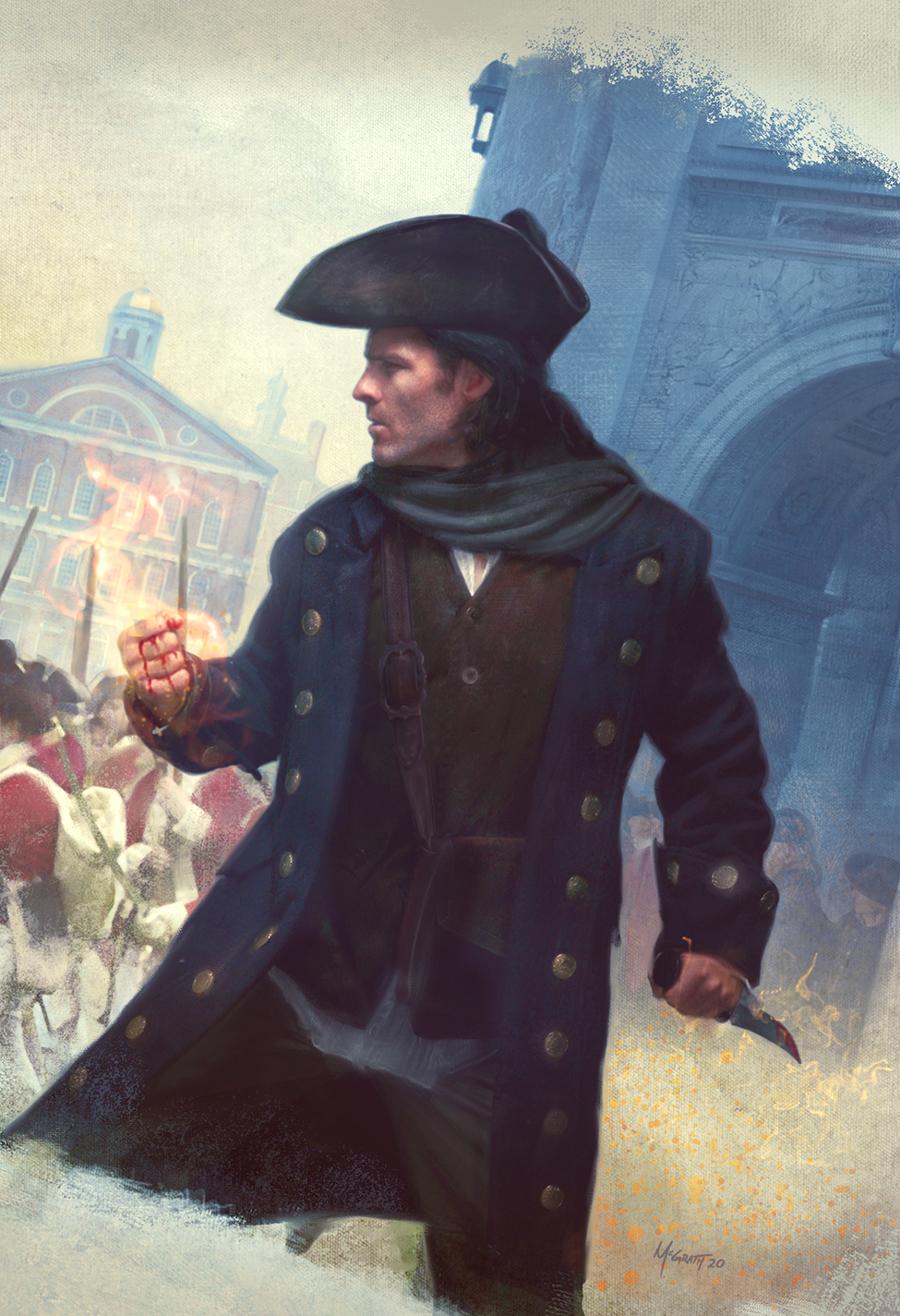For today’s Creative Friday post, I offer a teaser from my short story, “The Wreck of the Sarah Mohr,” which will be appearing in the DERELICT anthology that I’m co-editing with Joshua Palmatier (to be published by Zombies Need Brains). The story is set in the Thieftaker universe and, of course, stars Ethan Kaille, my thieftaking, conjuring hero.
I hope you enjoy this excerpt!
“The Wreck of the Sarah Mohr,”
©2021 D.B. Jackson
Boston, Province of Massachusetts Bay, 11 May 1767
Ethan Kaille limped northward on Treamount Street, newly earned coin jangling in his pocket, his mood far brighter than that of the grim men and women he passed on the damp, slush-covered lane. His jaw ached from a blow he’d taken from Nigel Billings, a blond-haired behemoth in the employ of Sephira Pryce, Boston’s most infamous thieftaker. He didn’t care. Nor did he mind the chill wind whipping across the city, or the low, dark clouds scudding overhead.
He had bested Sephira, collected his coin, and succeeded in delivering a punch or two to Nigel before putting the man to sleep with a conjuring. Now he was headed to the Dowsing Rod, the tavern owned and operated by his love, Kannice Lester, so that he might spend a bit of his hard-earned money on the finest chowder and Kent ale the city had to offer. All in all, a fine day.
Upon entering the tavern, he was greeted by the warmth of a grand fire in the great room hearth, and the aromas of bay and warm cream, roasted fish and baked bread. A few patrons stood at the bar drinking flips and ales, and others sat at tables near the fire, but the Dowser wouldn’t be full for another few hours.
Kelf Fingarin, Kannice’s hulking barman spotted Ethan as he walked in and had already filled a tankard for him when he reached the bar.
“Chowder, too, Ethan?”
“Aye, thanks. I’ll be at my usual table in the back.”
“Right. Kannice’ll be out shortly. She’ll want to see you.”
Ethan frowned. “That sounds ominous.”
“You had a visitor earlier. She can tell you more.”
More mysterious by the moment. Ethan set a shilling on the bar and carried his ale to the back. He hadn’t been seated long when Kannice emerged from the kitchen, accompanied by Kelf, a tureen of chowder held between them. She wore a deep blue gown, which brought out the pale azure of her eyes. Her cheeks were flushed, her auburn hair tied back, though as always a few strands flew free and fell over her brow.
Kelf said something to her and she glanced Ethan’s way, a smile on her lips. Matters couldn’t be all that dire.
The barman brought Ethan his chowder, while Kannice retreated to the kitchen again. She soon returned bearing rounds of bread, one of which she brought to his table. Placing it before him, she stooped and kissed him, her hair smelling faintly of lavender, a hint of whisky on her breath.
She sat in the chair adjacent to his. “I didn’t expect to see you here so early.”
“I had a good day.”
Her eyes fell to his jaw, which, no doubt, had already begun to darken. Ethan meant to heal himself before entering the tavern.
“Why do all your good days consist of beatings at the hands of Sephira Pryce’s ruffians?”
He grinned, winced. The skin around the bruise felt tight and tender. “In fairness, not all of them do. You and I have passed some very pleasant days without laying eyes on Sephira or her toughs. Or anyone else, for that matter.”
A reluctant smile crept over her features. “You found the gems you were seeking.”
“Aye, and was paid handsomely for their return.”
“And now you have a bit of coin to spend on me?”
“On you, on my rent, on the excellent chowders served here at the Dowsing Rod.”
“Well, I’d like a bit more spent on me.” She pulled from her bodice a folded scrap of paper, and held it out for him. When he reached for it, she pulled it back beyond reach. “Promise me.”
His smile returned. “I promise that all the coin—” He frowned. “Or at least most of the coin I make as a result of whatever you’ve scrawled on that parchment you’re holding, will be spent on you.”
Eyes narrowed, she handed him the paper. He unfolded it and read what was written in her neat, slanted hand.
James Hambly. Shipwreck. The Sarah Mohr. 7 tonight.
“Was it Mister Hambly himself who came?”
“Yes,” she said, her voice flattening. “Do you know him?”
“Not even by reputation. And the Sarah Mohr…”
“A ship, carrying goods in which he has a stake. He wouldn’t say more than that.” Her voice remained emotionless.
“You didn’t like him.”
She stared at her hands. “I barely spoke to him.”
“Kannice.”
“No, I didn’t like him.” She met his gaze. “He struck me as the sort of merchant who would have defied the non-importation agreements, and who cares only about the weight of his own purse. He said not a word about the ship’s crew. Only her cargo.”
“He came to a thieftaker. It’s my job to recover items, not sailors. And lest you forget, if I were a merchant, I might defy the agreements, too. It’s what Tories do.” He softened this last with a smile.
“Well, you’re not a merchant, and if I have anything to say about it, you won’t be a Tory for much longer.” She stood, then bent to kiss him again. “He’ll be back here at seven. If I’d known you were coming in so early, I’d have told him to arrive sooner.”
“No matter. Thank you.”
He ate his chowder and sipped his ale, trying to recall all that he had heard of James Hambly, which, admittedly, wasn’t much. The man lived in Newport or Providence—Ethan couldn’t remember which—and he had made a name for himself selling quality goods. He catered to the sort of clientele Sephira Pryce would have claimed as her own in her competition with Ethan: the prosperous and renowned. Likely, the goods lost with his ship would fetch a fair price, and that meant Ethan could demand a substantial fee for their recovery.
Why, though, would Hambly need him? Given the resources at his disposal, couldn’t he salvage the vessel and its contents on his own? And wasn’t this just the sort of job Sephira insisted should belong to her? Ethan’s jaw ached at the thought.
He finished his meal, and with hours left before the appointed time, left the Dowser for Boston’s waterfront. He hadn’t been at sea for many years, since his return from the prison plantation on Barbados where he served time for mutiny and lost part of his left foot to gangrene. Still, he knew a few men who worked the wharves, and had long been friendly with an old sea captain, Gavin Black, who, like Ethan, was a conjurer.
He learned little from the wharfmen with whom he spoke. They knew no more about Hambly than he did. His conversation with Gavin, however, proved more fruitful, though not particularly illuminating.
“Yeah, I know Hambly,” Gavin said, as he and Ethan strolled along Fish Street near Burrel’s Wharf. From his tone, Ethan gathered that he was no more fond of the merchant that Kannice had been. “I even transported cargo for him for a time. It’s been a few years now.”
“Is there a reason you stopped?”
Gavin glanced his way, his expression guarded. “I didn’t like what he had me carrying. I won’t say more than that.”
“Fair enough. Do you know anything about the Sarah Mohr?”
Surprise widened his eyes. “The Sarah Mohr is Lewis Gaine’s ship. Why, what’s happened to her?”
“Apparently she was wrecked. I don’t know where yet. When I learn more, I’ll let you know.”
“Thank you, Ethan. I’m grateful.” He hesitated. “As for the cargo I handled for Hambly—it was…” He shook his head. “I never should have agreed to it. It wasn’t illegal, but I’m ashamed nevertheless. I’m sorry for speaking to you the way I did.”
“You owe me no apologies.” Ethan halted and proffered a hand, which Gavin gripped. “Thank you for your time, Gavin. I’ll be in touch when I can.”
Ethan left him by the wharves and headed back to the Dowsing Rod. The last of the recent storm had moved through, and the sun hung low in the west, golden rays streaming through layers of thick, gray cloud. A stiff wind still blew, and the air had turned cold—winter’s last gasp.
The Dowsing Rod was far more crowded when Ethan returned. Still, Kannice spotted him as he entered and cast a glance toward a lone man seated at a table near the hearth. Hambly, Ethan assumed.
As he approached the table, the man glanced up, then stood. He was about Ethan’s height, with dark eyes in a square, handsome face. Flecks of silver salted a head of dark curls. He wore a dark blue suit. A tricorn hat, in far better condition than Ethan’s rested on the table beside a cup of Madeira.
“Mister Kaille?”
“Yes, sir. Mister Hambly, I assume.”
“That’s right.”
They shook hands, and at a gesture from the merchant Ethan lowered himself into the opposite chair.
“I won’t waste your time,” Hambly said. “I have it on authority that you’re good at your work, you’re honest, and you’re discreet. That last is most important to me.”
“Yes, sir.”
“I also understand…” He faltered, looked around to see that no one was listening, and leaned in. “…That you are a man of diverse talents, if you catch my meaning.”
Indeed, Ethan did. Hambly needed help with something magickal, and someone had told him Ethan was a conjurer. No wonder he had chosen Ethan over Sephira. Ethan didn’t like the idea of strangers discussing his conjuring abilities. Spellers were still hanged as witches in the Province of Massachusetts Bay, and Ethan had no desire to wind up with a noose around his neck.
On the other hand, his talents appeared to have earned him this job, whatever it might entail, so he couldn’t complain too much.
“How can I be of service, sir?”
This was all the confirmation Ethan intended to offer, and Hambly seemed to take it as such.
“I hired a ship to bring some goods up to Newport. Valuable goods.”
“The Sarah Mohr.”
“Just so. Unfortunately, the storm that battered the region over the past few days blew her off course, and rather than making port, she ran aground between Newport and here, on the shoal near Point Alderton.”
“South of Hull.”
“That’s right.”
“And where was she coming from?”
“She had followed the coastline north.”
This wasn’t exactly what Ethan asked.
Seeing his frown, Hambly hurried on. “Where she was coming from doesn’t matter. What’s important is that she beached. Several of her crew were injured. Some were killed.”
“And Captain Gaine?”
The merchant considered Ethan anew. “You’ve done your research. I suppose I should be impressed.” He straightened. “Gaine suffered a broken leg, and was borne to safety by the fittest among his crew. He should be fine. The ship itself is my primary concern.”
“She remains on the shoal?”
“For now. I fear a strong tide could pull her back out to sea, crewless and at the mercy of the surf. The night after tomorrow, the moon will be full. A spring tide could cost me dearly.”
“I believe I understand. But I’m curious as to why the uninjured crew can’t go back to salvage your cargo.”
“Forgive me, Mister Kaille, but you understand nothing.”
Ethan bristled. “Then, by all means, enlighten me.”
The merchant lifted a hand. “Forgive me. I phrased that poorly. But you see, I don’t need you to salvage the ship. As you say, Captain Gaine’s crew will see to that. Right now, though, they are being prevented from doing so.”
“Prevented? By what?”
He leaned in again. “Ghosts.”
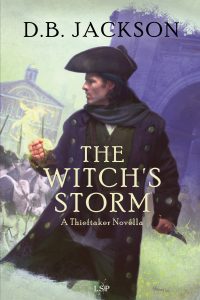 DBJ: Well, I suppose I should point out that while I haven’t written a Thieftaker novel in some time, I have been writing and publishing Thieftaker-universe short stories almost yearly since that last novel came out. But this was a far more demanding project and honestly, I enjoyed it immensely. I love these characters — not only Ethan, but also his nemesis, Sephira Pryce; his love, Kannice Lester; his mentor, Janna Windcatcher; his closest friend, Diver Jervis; and a host of historical figures including Samuel and John Adams, Joseph Warren, Stephen Greenleaf, and others. All of them are here in these new stories. But I have also brought in new characters: a new set of villains and some new allies as well. So for me as a writer, there was enough here that was familiar to make me feel like I was reconnecting with old friends, but there was also enough innovation for the plot lines and character interactions to feel fresh and exciting. I hope my readers agree!
DBJ: Well, I suppose I should point out that while I haven’t written a Thieftaker novel in some time, I have been writing and publishing Thieftaker-universe short stories almost yearly since that last novel came out. But this was a far more demanding project and honestly, I enjoyed it immensely. I love these characters — not only Ethan, but also his nemesis, Sephira Pryce; his love, Kannice Lester; his mentor, Janna Windcatcher; his closest friend, Diver Jervis; and a host of historical figures including Samuel and John Adams, Joseph Warren, Stephen Greenleaf, and others. All of them are here in these new stories. But I have also brought in new characters: a new set of villains and some new allies as well. So for me as a writer, there was enough here that was familiar to make me feel like I was reconnecting with old friends, but there was also enough innovation for the plot lines and character interactions to feel fresh and exciting. I hope my readers agree!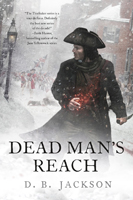 DBJ: There was a lot to work with actually. On the one hand, the trials of the soldiers and their captain were a huge deal. Think of all the big trials we’ve had in recent history — the way they captivate the public — and then magnify that about a hundred times. The Boston Massacre was a huge, huge deal throughout the colonies, but in Boston in particular. It’s easy to forget that the population of the city was only about 15,000 at this time. So while “only” five people died that night in March, chances are that if you lived in Boston, you’d had some contact with at least one of the victims. Add to that the fraught political climate of the time and you have a recipe for a lot of tension. Plus, as the title of the first novella suggests, right before the trial began, Boston was hit by a hurricane. Now, I have adopted the storm for my own narrative purposes and added a magical element. But the fact is, there was a ton going on, historically speaking, and I was able to work most of it into the novellas.
DBJ: There was a lot to work with actually. On the one hand, the trials of the soldiers and their captain were a huge deal. Think of all the big trials we’ve had in recent history — the way they captivate the public — and then magnify that about a hundred times. The Boston Massacre was a huge, huge deal throughout the colonies, but in Boston in particular. It’s easy to forget that the population of the city was only about 15,000 at this time. So while “only” five people died that night in March, chances are that if you lived in Boston, you’d had some contact with at least one of the victims. Add to that the fraught political climate of the time and you have a recipe for a lot of tension. Plus, as the title of the first novella suggests, right before the trial began, Boston was hit by a hurricane. Now, I have adopted the storm for my own narrative purposes and added a magical element. But the fact is, there was a ton going on, historically speaking, and I was able to work most of it into the novellas.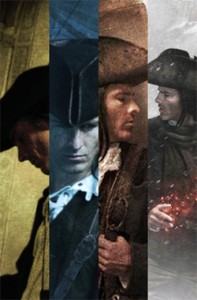 DBJ: Definitely. The fact is, I’m probably better known for Thieftaker than I am for anything else I’ve published, either as D.B. Jackson or as David B. Coe. My readers always seem to want more of Ethan’s adventures. And while I have drawn upon a lot of pre-Revolution history so far, there’s so much more to explore. Plus, I can take the story forward into the War for Independence itself. There’s really no end to what I can do with Ethan and company. So yes, given that there is some demand, and given how much I love to play in this universe, I have no doubt that I’ll be writing more novels, more novellas, more short stories. So stay tuned!
DBJ: Definitely. The fact is, I’m probably better known for Thieftaker than I am for anything else I’ve published, either as D.B. Jackson or as David B. Coe. My readers always seem to want more of Ethan’s adventures. And while I have drawn upon a lot of pre-Revolution history so far, there’s so much more to explore. Plus, I can take the story forward into the War for Independence itself. There’s really no end to what I can do with Ethan and company. So yes, given that there is some demand, and given how much I love to play in this universe, I have no doubt that I’ll be writing more novels, more novellas, more short stories. So stay tuned!








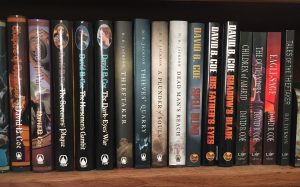 This past weekend I gave a talk on world building for the Futurescapes Writers’ Workshop. It was a lengthy talk, and I’m not going to repeat all of it here. But I did want to focus on one element of the topic, because I think it’s something writers of fantasy, of historical fiction, of science fiction, and of other sub-categories of speculative fiction lose sight of now and again.
This past weekend I gave a talk on world building for the Futurescapes Writers’ Workshop. It was a lengthy talk, and I’m not going to repeat all of it here. But I did want to focus on one element of the topic, because I think it’s something writers of fantasy, of historical fiction, of science fiction, and of other sub-categories of speculative fiction lose sight of now and again.